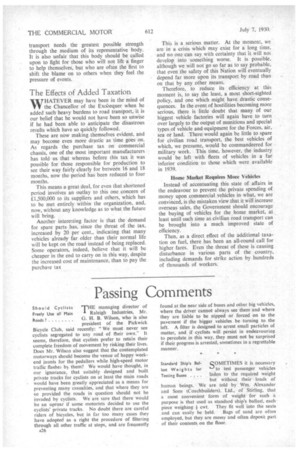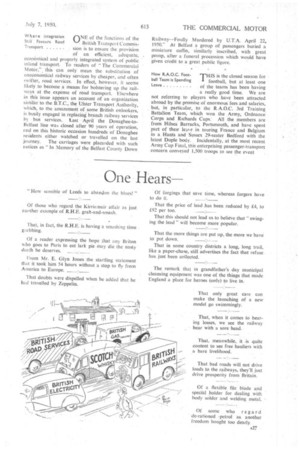Passing Comments
Page 28

Page 29

If you've noticed an error in this article please click here to report it so we can fix it.
Should Cyclists THE managing director of Freely Use all Main Raleigh Industries, Mr. Roads G. H. B. Wilson, who is also president of the Pickwick Bicycle Club, said recently: "We must never see cyclists segregated to any road of their own." It seems, therefore, that cyclists prefer to retain their complete freedom of movement by risking their lives. Does Mr. Wilson also suggest that the contemplated motorways should become the venue of happy weekend jaunts for the pedallers while high-speed motor traffic flashes b} them? We would have thought, in our ignorance, that suitably designed and built private tracks for cyclists on at least the main roads would have been greatly appreciated as a means for preventing many casualties, and that where they are so provided the roads in question should not be invaded by cyclists. We are sure that there would be an uproar if some motorists decided to use the cyclists' private tracks. No doubt there are careful riders of bicycles, but in far too many cases they have adopted as a right the procedure of filtering through all other traffic at stops, and. are frequently
A26 found at the near side of buses and other big vehicles, where the driver cannot always see them and where they are liable to be nipped or forced on to the pavement if the bigger vehicles be turning to the left. A filter is designed to arrest small particles of matter, and if cyclists will persist in endeavouring to percolate in this way, they must not be surprised if their progress is arrested, sometimes in a regrettable manner.
Standard Ship's Bal.Q0METIMES it is necessary last We for to test passenger vehicles Testing Buses . . . laden to the required weight
but without their loads of human beings. We are told by Wm. Alexander and Sons (Coachbuilciers), Ltd., of Stirling, that a most convenient form of weight for such a purpose is that used as standard ship's ballast, each
piece weighing k cwt. They fit well into the seats
and can easily be •held. Bags of sand are often employed, but they are messy and often deposit part of their contents on the floor.
Where Integration nNE of the functions of the
Still Favours Road `.." British Transport Commis Transport sion is to ensure the provision
of an efficient, adequate, economical and properly integrated system of public inland transport. To readers of "The Commercial Motor,". this can only mean the substitution of uneconomical railway service's by cheaper, and often swifter, road, services. In effect, however, it seems likely to become a means for bolstering up the railways at the expense of road transport. Elsewhere in this issue appears an account Of an organization sitnilaf to the B.T.C., the Ulster Transport Authority, which, to the amazement of some British onlookers, is busily engaged in replacing branch railway services by • bus services Last -April the Donaghee-toBelfast line was closed .after 90 years of operation, and on this historic occasion hundreds of Donaghee residents either watched or travelled on the last journey. The carriages were placarded with such notices as " In Memory of the Belfast County Down
Railway--Foully Murdered by UT A. April 22, 1950." At Belfast a group of passengers buried a miniature coffin, similarly inscribed, with great pomp, after a funeral procession which would have given credit to a great public figure.
How R.A.O.C. Football Team is Spending
Leave
THIS is the closed season for A football, but at least one of the teams has been having a really good time. We are not referring to players who have been attracted abroad by the promise of enormous fees and salaries, but, in particular, to the R.A.O.C. ,3rd Training Battalion Team, which won the Army, Ordnance Corps and Richards Cups. All the members are from Hilsea Barracks, Portsmouth, and have spent part of their lease in touring France and Belgium in a Hants and Sussex 29-seater Bedford with the latest Duple body. Incidentally, at the most recent Army Cup Final, this enterprising passenger-transport concern conveyed 1,500 troops to see the event .












































































